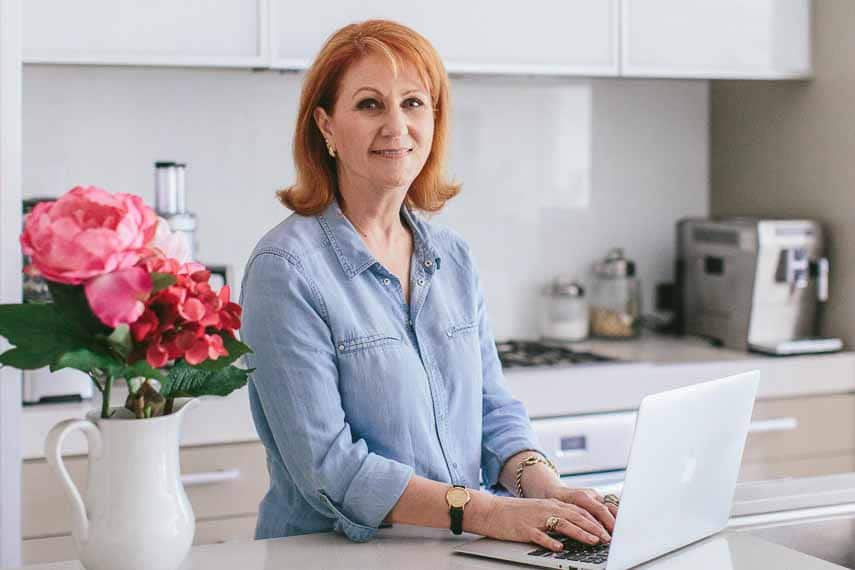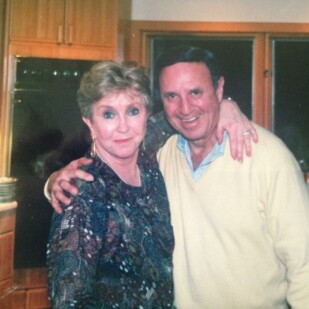This post may include affiliate links. Please see our complete disclosure here.
Q & A with Suzanne Perazzini from Strands of My Life
We first came across Suzanne Perazzini when we were acquainting ourselves with what educational materials were available online to help those following the low FODMAP diet.
She is a nutritional therapist specializing in irritable bowel syndrome and is certified by Monash University on the low FODMAP diet and is based in Auckland, New Zealand.
Her website, Strands of My Life, features low FODMAP recipes, videos and articles on IBS and the low FODMAP diet. She has suffered from IBS, as she says, “forever”, and after having her life transformed by the low FODMAP diet, she decided to dedicate her days to coaching others on how to eliminate their IBS symptoms.
Suzanne’s latest book is The Low FODMAP 6-Week Plan & Cookbook. She has graciously agreed to an interview and has also written an article for our community – 10 Tips for Eliminating a Bloated Belly.
Dédé Wilson: Suzanne, thank you so much for doing this interview. Most likely anyone at home who is following the low FODMAP diet has come across your website but we thought we’d like to do a more formal introduction. You have recipes and meal plans, publish books and videos, to name just some of what you do, but let’s go back to the beginning. Tell us about how you were dealing with your IBS pre-FODMAP and also how you discovered the diet.
Suzanne: I have suffered from IBS all my life – I can remember as a child being obsessed with the toilet and needing to spend ages in there trying to do my business. I couldn’t understand why my sisters could run in and out in a few minutes and it was all over.
So, I spent decades obsessed with the toilet, saying no to invitations that might expose my secret – because this is a secretive affliction.
I went to so many health practitioners, from the medically qualified to the more bizarre end of the spectrum with voodoo practices in an attempt to work out why I was so different from everyone else. None of them had an answer even though they all had an opinion, of course and would recommend some medication or herbs.
The number of times I heard that I should be eating more fruit, vegetables and fibre I couldn’t count on both my fingers and toes. And of course we now know that is the worst advice of all. But I kept going away and trying it – over and over again.
They say that if something is not working, then change it. Don’t ask me why I didn’t change it for so long. I guess I believed they knew more than me, but I was wrong. In the end, I had to do it by myself. Thank heavens for the invention of the internet.
I Googled and Googled until the internet, over the years, caught up with what I needed and eventually I heard about the low FODMAP diet. I ignored it at first because it was so complex to understand. Lactose-free – give me that – that’s easy – and I tried it for years – unnecessarily, by the way. Gluten-free – simple – cut out a few guilty grains and it’s done.
But FODMAPs are in nearly all foods so we can’t do a slash and burn on them or we would die from malnutrition. It’s complicated – it’s about good foods and bad foods, yes, but it’s also about amounts, combinations and accumulation. And so I kept ignoring it.
But one day I was desperate enough to stop and actually read a bit more in-depth. And then I realized this was what I needed. It had to be the most complex diet in the Universe, didn’t it!
So, began a time of intensive research and experimentation because this was before there was really anything about it out there, but I knew I was onto something so I persevered through all the hiccups and disappointments while I figured it all out.
At the time, I had a blog documenting my journey to find a solution and, once I turned to the low FODMAP diet and focused on that, my subscriber list exploded and I was getting daily emails asking for help.
I was working fulltime in the corporate world at the time and, though I answered everyone, I felt my inability to really help them on a one-to-one basis acutely so I left my job, put out an email to my subscribers about a six-week program I was giving a test run and the response was so encouraging that coaching the low FODMAP diet became a full time job.
Your openness about your journey obviously connects with people. It is so very important that IBS suffered understand that they are not alone. What tools did you use to help you approach the diet? Was it immediately helpful for you?
It took a long time to get it right because there was very little information about it back then but I realized early on that the Monash University information was the only safe source of anything to do with the low FODMAP diet. Even now, about 90% of what is on the internet to do with the diet is inaccurate.
So, I was pretty much on my own but I did do the hydrogen breath test, which we now know of course is not an accurate test, and that led me to a dietician who had a list of foods to eat. She didn’t know much else but it was a start for me.
From there, I fumbled along on my own. But I immediately saw some improvement just by cutting back on fruit and vegetables, which in fact is where my major triggers lie along with legumes. But there were still bad days and it took a while to work out that Fodmaps are not the complete picture.
We also have to look at controlling a host of other gut irritants like fat and fibre.
What were some of the early challenges for you when adopting and following the diet?
I was working fulltime and the temptation to pop out and grab a sandwich for lunch or a cake for a snack was always present. I had to learn self-discipline around food, but the benefit of staying away from certain foods was enormous, and so I had real incentive to stay strict.
But the greatest challenge was a lack of accurate information and the fact that the Monash University back then wasn’t talking about the part that fat, fibre, caffeine, alcohol, stress, lack of sleep etc. play in our IBS symptoms. They do now though.
Yes, more scientific studies and clinical trials have been conducted and who knows what we will learn as researchers go forth with further inquiry. Thankfully they keep revealing more information that helps us in our healing. Tell us about your coaching program. Do people usually come to you with help beginning the diet, or after they have tried on their own only to realize that they need help?
I have a few different coaching programs but the most popular is the six-week one-to-one program that takes the client through both the elimination and reintroduction stages of the diet to create their own individual version that will keep them symptom-free.
This involves customized meal plans, diary pages, videos, worksheets and homework. Week by week, we also look at different aspects of a balanced lifestyle including sleep, stress, exercise etc. because they are an integral part of subduing symptoms. Contact is daily throughout the program.
This is an international online program with doctors and dieticians referring their patients to my website as a source of information and for my coaching from all over the world. I’ve had clients in India, Belgium, Colombia, Ecuador, Luxembourg, Germany, Switzerland etc. and of course many, many clients from the US, UK, as well as Australia and NZ.
My clients are at every stage of their journeys with IBS from those who have just been diagnosed to octogenarians who have had it all their lives. Many try the low FODMAP diet by themselves but eventually come to the realization that they need guidance and that’s when they come to me.
Your international roster of clients is testament to the pervasiveness of IBS. It truly is a worldwide problem. What are some of the common pitfalls you see that your clients encounter?
As mentioned above, they try it by themselves following a list they downloaded from the internet before getting help. That wastes a lot of their time and is also likely to turn some IBS sufferers off the diet because they were making mistakes but didn’t realize and so decided the diet was not right for them. That is so sad.
Once they start getting guidance from me, they still have obstacles to overcome. They nearly always come with a whole package of beliefs about what causes their symptoms, and it can be difficult to persuade them otherwise. The nocebo effect is very real with IBS sufferers – they get sick from eating a food simply because they firmly believe it is a trigger.
I have proved to clients over and over again that many of their beliefs around lactose and wheat in particular are in fact not correct for them as individuals. I have to fight the powerful effect of the internet that has villainized certain foods, which are often not triggers for many people. For example, only 25% of those with IBS have an issue with lactose and even then, it may be a mild trigger.
Self-discipline is another challenge for many, though I am often surprised at the strength of my clients to stick to the program once they have committed themselves to this path.
Another challenge is that once a person is symptom-free, which can happen fairly quickly on an accurate diet especially for those with IBS-D, there is a tendency to think that maybe they never had a problem in the first place, and so they test their limits and get a rude awakening with the return of their symptoms.
This does seem to be a necessary part of acceptance that IBS is for life.
What are some of your favorite tips that might help our readers?
Accuracy is key. There are no shades of grey with the elimination stage of the diet. Shades of grey will enter later but not in the beginning. Commitment to the diet has to be firm in order to get quick results.
It’s very important to realize that a list of good and bad foods is just the beginning – there is so much more to this. FODMAPs are the foundation stone for all else but you must look at other gut irritants like fat, fibre, caffeine, alcohol etc and also work on creating a lifestyle that supports the diet.
I love that you said this about black and white versus grey. First of all, it is true and bears repeating, and it is so often misunderstood. It can be hard for newbies to understand that strictness at one point can work together with grey variability later on. I agree with being very strict in the beginning. I believe it helps in the long run and overall. And then once a baseline is set, the individual, with help from someone like you, can tease out their own relationship to FODMAPs.
Tell us about your new book, The Low FODMAP 6-Week Plan & Cookbook.
This book contains all the knowledge I’ve accumulated over many years of living on the diet. It also includes everything I’ve learned from the hundreds of coaching clients I’ve helped, as well as the substantial research I’ve conducted and the many in-depth courses I’ve taken on the digestive system and the gut microbiome.
The first section explains IBS and the low-FODMAP diet. The second section is the exact program I use with my coaching clients. It consists of six meal plans, 100 recipes, six diary pages for recording vital information, six weekly exercises to help you establish a balanced lifestyle to manage your IBS, and six weekly sections on integrating the diet into your everyday life.
Each week ends with a case study to inspire you to dig deep and to help you stay the course.
Suzanne, we wish you success with your book and thank you so much for your time, and for your article, 10 Tips for Eliminating a Bloated Belly. It is a great addition to FODMAP Everyday®. As someone for whom bloating was the main devastating symptom, I appreciate you laying out what to watch out for and what can be done.
You, like us, want to help IBS sufferers learn to thrive on the low FODMAP diet and show them that they can have a vibrant and tasty life.
Suzanne’s latest book, The Low FODMAP 6-Week Plan & Cookbook is now available for pre-order here:










Is there a written plan for the elimination part of the Low FODMAP diet? How do I know how to start?
Hi Marie, The very beginning is to get a diagnosis of IBS from a gastroenterologist. It is not advisable to self-diagnose as you must first be screened for diseases and conditions whose symptoms can overlap with IBS, such as celiac disease, endometriosis, diverticular disease, among several others.
Once diagnosed, FODMAP Everyday and Monash University (the originators of the diet) always recommend that you undertake the diet under the guidance of a registered dietitian, or the equivalent in your country. There are even FODMAP trained RDs who can help you. Perhaps consult our International RD Directory to find one near you, or for a RD who can conduct sessions with you via Skype or phone. Everyone’s dietary needs are unique and no one’s Elimination, Challenge or final Integration phases will look exactly the same. You should also download the Monash smartphone app, for up-to-date info and my book, The Low FODMAP Diet Step by Step, has a full description of all of the low FODMAP diet phases (although it is meant to be used along with a RD in real life).